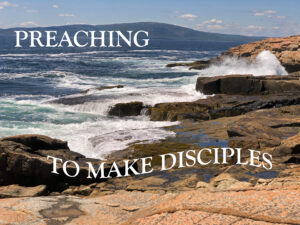
SHOCKING STAT: Less than 10% of evangelical sermons mentioned the words sin, salvation, heaven, or hell!
The statistic comes from a database of almost 50,000 sermons compiled by the Pew Research Center, which were delivered between April 7 and June 1, 2019.[i] Much evangelical preaching today identifies human needs and proclaims Christ as a need-fulfiller. It is a man-centered gospel. Bill Hull nicknamed it “gospel Americana.”[ii] The message is simple. “God loves you and has a wonderful plan for your life!” The result of such a reductionist message is that many people become converts who want no part of the demands of being a disciple.[iii]
NEW ONLINE COURSE IN PASTORAL PREACHING
We have produced a new online course entitled “Pastoral Preaching,” which you can access here. One of the sessions in that course is on the topic of “Preaching as Disciple-Making.” What kind of preaching makes disciples? What are the characteristics of disciple-making preachers? Here are the characteristics I explore in that session.
- Disciple-making preachers announce a kingdom gospel, not an orphan gospel.
- Disciple-making preachers address crowds to provoke deeper investigation by learners.
- Disciple-making preachers emphasize communal instruction to avoid an individualized faith.
- Disciple-making preachers model biblical interpretation to lead learners to think biblically.
- Disciple-making preachers proclaim doctrine to equip learners to think doctrinally.
- Disciple-making preachers specialize in a faith/work integration, not a sacred/secular divide.
- Disciple-making preachers call learners to be citizens of heaven who are ambassadors on earth.
Early in my ministry, I read a book that congealed my thinking about pastoral ministry and became foundational to my philosophy of preaching. Gene Getz wrote a book entitled, Sharpening the Focus of the Church. It was reprinted in 2012, and I recommend it as a valuable resource for pastors today. A friend reminded me of the book recently as we talked about what has gone wrong with preaching in the evangelical church.
GATHERING AND SCATTERING
Gene Getz’s foundational message dealt with the gathering and scattering of the church in the New Testament. The church gathered for edification and scattered for evangelism. Pastoral preaching sought to disciple Christians in the gathered worship assembly. It was about teaching people to observe all the things Christ had commanded so that preachers developed believers who were complete in Christ (Col. 1:28). The early church scattered to evangelize people. Evangelism took place “out there,” not “in here.” They evangelized “while going” (Mt. 28:19). Missional preaching took place in the scattered church. I built my philosophy of preaching on this foundation which is why I now feel like a dinosaur in the church.
My friend shared a recent conversation he had with Gene Getz about the state of preaching today. Getz told him that the evangelical church today had reversed the pattern. Now the church gathers for evangelism and scatters for edification. Attractional Christianity is built on the idea that we attract crowds to church for the preacher to evangelize. The gathered church exists for evangelism. Edification is supposed to take place now in the scattered church – in the small groups that meet during the week. Teaching is now the responsibility of individual Christians, while evangelism is the responsibility of professional preachers. Now we want preachers who are evangelists, not pastors, and we pay them to do the work of evangelism while the work of edification is given short shrift.
The sad reality is that less than 50% (most often far less) of the attendees at the gathered meeting of the church participate in small groups during the week. Furthermore, the learning that takes place in these small groups is often superficial and even misleading. Small groups often devolve into a round of sharing what this verse “means to me,” which often leads to the blind leading the blind. The result is growing biblical illiteracy in our churches. If disciples are learners, little learning is happening in the scattered church. The result is the decline of discipleship.
We need to reverse the reverse! The gathered church should be for the purpose of teaching people to become Christlike disciples. We should equip the scattered church to be more effective in evangelism. Our job as pastoral preachers is to make disciples by teaching them all that the Bible teaches us. We preach to equip others to do the work of the ministry and grow the church (Eph 4:11-12). We must become disciple-making preachers once again!
[i] https://www.pewforum.org/2019/12/16/the-digital-pulpit-a-nationwide-analysis-of-online-sermons/
[ii] Bill Hull and Brandon Cook, The Bonhoeffer Project, “History,” line 3, https://thebonhoefferproject.com/history
[iii] Bill Hull, Conversion & Discipleship, 31.
[iv] Kevin Vanhoozer, Hearers & Doers, 47.
[v] Arndt & Gingrich, A Greek-English Lexicon, 815.

